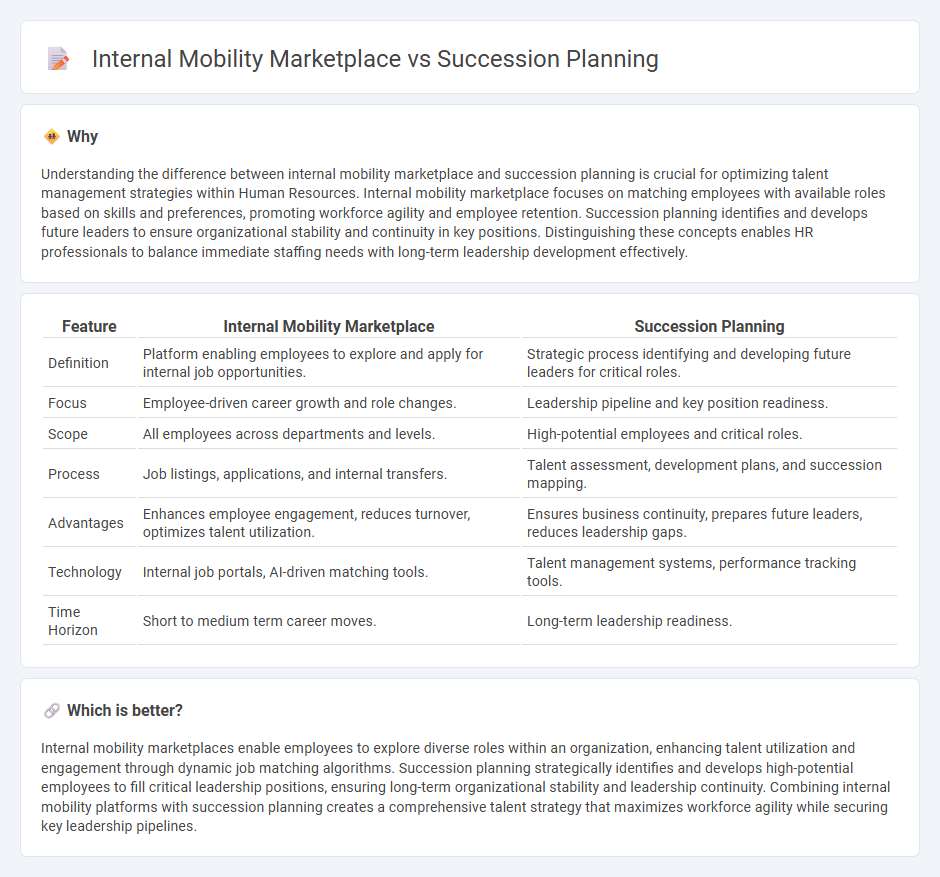
Internal mobility marketplaces empower employees to explore new roles within an organization, enhancing career development and talent retention by matching skills with available opportunities. Succession planning focuses on identifying and preparing future leaders to ensure business continuity and leadership stability over time. Discover how integrating both strategies can optimize workforce agility and organizational resilience.
Why it is important
Understanding the difference between internal mobility marketplace and succession planning is crucial for optimizing talent management strategies within Human Resources. Internal mobility marketplace focuses on matching employees with available roles based on skills and preferences, promoting workforce agility and employee retention. Succession planning identifies and develops future leaders to ensure organizational stability and continuity in key positions. Distinguishing these concepts enables HR professionals to balance immediate staffing needs with long-term leadership development effectively.
Comparison Table
| Feature | Internal Mobility Marketplace | Succession Planning |
|---|---|---|
| Definition | Platform enabling employees to explore and apply for internal job opportunities. | Strategic process identifying and developing future leaders for critical roles. |
| Focus | Employee-driven career growth and role changes. | Leadership pipeline and key position readiness. |
| Scope | All employees across departments and levels. | High-potential employees and critical roles. |
| Process | Job listings, applications, and internal transfers. | Talent assessment, development plans, and succession mapping. |
| Advantages | Enhances employee engagement, reduces turnover, optimizes talent utilization. | Ensures business continuity, prepares future leaders, reduces leadership gaps. |
| Technology | Internal job portals, AI-driven matching tools. | Talent management systems, performance tracking tools. |
| Time Horizon | Short to medium term career moves. | Long-term leadership readiness. |
Which is better?
Internal mobility marketplaces enable employees to explore diverse roles within an organization, enhancing talent utilization and engagement through dynamic job matching algorithms. Succession planning strategically identifies and develops high-potential employees to fill critical leadership positions, ensuring long-term organizational stability and leadership continuity. Combining internal mobility platforms with succession planning creates a comprehensive talent strategy that maximizes workforce agility while securing key leadership pipelines.
Connection
Internal mobility marketplaces facilitate the identification and development of high-potential employees, directly supporting succession planning by ensuring a ready pipeline of talent for key roles. By leveraging real-time data on employee skills, performance, and career aspirations, organizations can strategically align internal candidates with future leadership positions. This integration enhances workforce agility, reduces external hiring costs, and drives long-term organizational stability.
Key Terms
**Succession Planning:**
Succession planning strategically identifies and develops high-potential employees to ensure leadership continuity and mitigate organizational risks. It involves structured talent reviews, competency mapping, and tailored development programs to prepare successors for critical roles. Explore more about how succession planning secures your company's future leadership.
Leadership Pipeline
Succession planning strategically identifies and develops high-potential leaders to fill critical leadership roles, ensuring organizational continuity and stability. Internal mobility marketplaces facilitate transparent, dynamic movement of talent across roles, accelerating leadership development by matching skills to emerging opportunities. Explore how integrating these approaches enhances the leadership pipeline and drives sustainable growth.
Talent Bench Strength
Succession planning emphasizes identifying and developing high-potential employees to ensure leadership continuity and organizational resilience, while an internal mobility marketplace facilitates real-time talent movement by matching skills to open roles, enhancing agility and employee engagement. Talent bench strength is strengthened through both strategies, where succession planning prepares future leaders and internal mobility accelerates skill diversification across the workforce. Explore deeper insights on leveraging these approaches to maximize your organization's talent potential.
Source and External Links
Succession Planning: All You Need To Know [2025 Edition] - AIHR - Succession planning is the process of selecting and developing key talent to ensure continuity in critical roles by identifying essential positions, assessing current talent, and preparing future leaders through targeted development programs.
Succession Planning: 7-Step Guide & Template - Paylocity - Succession planning is a long-term strategy to identify employees who can replace key roles and prepare them in advance, ensuring business continuity, improving retention, and fostering diversity through a transparent and collaborative approach.
Succession planning - Wikipedia - Succession planning is the process and strategy of preparing internal candidates to fill key leadership or critical roles when they become vacant, often involving gradual skill development and advisor support, especially in family-owned businesses.
 dowidth.com
dowidth.com